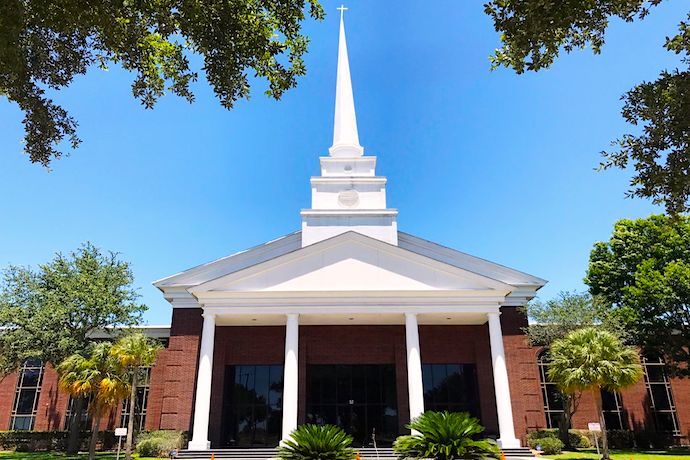The two Christian schools at the center of Carson v. Makin—the case in which the Supreme Court just ruled that the state of Maine must include religious schools in its tuition assistance program for rural families that had, until that point, been limited to nonsectarian schools—sound a lot like the evangelical institutions I attended growing up, in Indianapolis, Indiana and Colorado Springs, Colorado. As The New York Times reports, Maine’s Supreme Court brief noted that the schools “candidly admit that they discriminate against homosexuals, individuals who are transgender and non-Christians.”
This stance is par for the course for evangelical schools, which frequently refer to themselves simply as “Christian schools” or “Christian academies.” Catholic schools, which have their own problems and are certainly no havens of LGBTQ inclusion, are nevertheless often somewhat more lax on the matters Maine points to in the brief—for example, they frequently allow non-Christians to enroll (which is uncommon in evangelical schools, though not unheard of).
In the wake of the unsurprising but nonetheless disastrous decision by the (in my view illegitimate) Roberts Court, many will write about its deficiencies in terms of constitutionality, the Establishment Clause, and other issues of jurisprudence. In this column, I’ll be taking a different tack, pointing to my own and others’ experience in ideologically driven Protestant schools in the hopes of waking more of the public up to just what taxpayers are forced to fund when religious schools get access to state monies.
The Christian school in Indy I graduated from in 1999 is a K-12 institution that I’d describe as providing “the elite culture warrior track.” By this I mean that the school, while undoubtedly a bastion of far right-wing ideology, biblical “inerrancy” doctrine, and anti-LGBTQ animus, also boasted of its students’ high test scores and college placement rates (though to be sure the guidance counselor tried to funnel us into evangelical colleges). The school offered a college prep curriculum recognized by the state of Indiana, and by the time I graduated, it offered a handful of Advanced Placement courses, two of which I took. (Since I earned a five on both my AP English and AP biology exams, I can’t say I was unprepared).
The school had all sophomores take a practice Preliminary SAT before they had us all take the actual PSAT to ensure that we all qualified for the National Merit Scholarship competition. The goal in preparing us for college and future careers was, of course, to have us “advance God’s kingdom” in all our pursuits, either working in evangelical ministries or Christian Right lobbying organizations, or else funding those who do as entrepreneurs, executives, engineers, lawyers, doctors, investment bankers, etc. The Christian school I attended in Colorado Springs in seventh and eighth grade was broadly similar.
I bring all this up in order to emphasize that my Christian school experience was far from the worst. Some fly-by-night church schools don’t prepare graduates for life in the real world at all. Many are much more fundamentalist in their approach than the one I graduated from. For example, while my school encouraged students to volunteer at Billy Graham’s 1999 crusade in Indianapolis, a friend from my church youth group who went to another local Christian school told me that her school forbade its students from involvement with Graham (who, had, decades earlier, bailed Martin Luther King, Jr. out of jail) because he was “too liberal.”
The Christian schools the Supreme Court is forcing states to fund will run the gamut. But even if every Christian school funded with taxpayer dollars were like the ones I went to, here’s a sampling of the egregious wrongs that you, the taxpayer, would still be funding:
- Students being required to provide a Christian “testimony” about our conversion experiences in order to gain admission.
- Purity culture. Did you know: Fun (alternative) fact! Anything remotely sexual we did with a boyfriend or girlfriend we didn’t eventually marry constituted cheating on each other’s future spouses.
- Weekly (and sometimes more frequent) mandatory chapel services, sometimes featuring manipulative altar calls, frequently featuring anti-choice and anti-LGBTQ messaging along with exhortations to “witness”—that is, to target non-Christians for conversion efforts. The most ironic example I remember is being told, “If you had the cure for cancer, you would share it, right? Well salvation from hell is so much more important than a cure for cancer!” It’s funny because everyone at the school was opposed to universal healthcare. Once, when a local Republican politician came to speak and made vague references to shared faith and values, I remember one of my teachers saying she was troubled by that—because he was acting like his faith was the same as ours when he was Jewish. He hadn’t mentioned being Jewish while speaking to us. For obvious reasons.
- Partisan mobilization for right-wing politics. My school took juniors and seniors on field trips to the annual conventions of an organization called Citizens Concerned for the Constitution. (It has since rebranded as Advance America, and bills itself as “Indiana’s largest pro-family and pro-church organization.”) After “enjoying” this far-right circus, we distributed their voter guides via direct mail—on school time.
- Required instruction in Christian “apologetics,” that is, the defense of the faith as the only, and absolute, Truth. This included instruction in how to identify logical fallacies, which, along with the solid training I got in English classes about how to write well and formulate coherent arguments, left me with unbearable levels of cognitive dissonance.
- A required Bible class in which the “correct” answer to a test question about when the world was created was “4004 BC.” The teacher, a hardcore Calvinist, also told us he thought “aborted babies” went to hell.
- That AP biology class I took? The teacher, who sometimes made disparaging comments about girls’ capabilities in science and was opposed to environmentalism, had us watch “documentaries” about young earth creationism and “flood geology” in class. For a class to qualify as part of the AP program requires use of a standard introductory college textbook, but he refused to teach us the evolution chapters, telling us to read them on our own and regurgitate them for the exam. Apparently lying for Jesus is okay when you’re on the elite culture warrior track. Lesson learned.
- Teachers beginning class with prayer and devotionals that often featured highly, erm, questionable content. That same AP biology teacher tended to start his classes off with rambling devotionals he called “thoughts,” sometimes wasting up to half of our class time with them. These “thoughts” were full of charismatic and often apocalyptic content. Toward the beginning of each year I was in his class (he was also my chemistry teacher), he used one of these devotionals to predict that Christ was probably returning this fall, sometime around Yom Kippur. (This is not a Dave Barry column, but I feel compelled to state that I am not making this up.) I’ve heard from more recent alumni that he continues to predict the imminent Rapture.
I could go on—there are so many stories—but that’s probably enough. And again, my experience is one of significant privilege within the Christian school context. I would even stress that many teachers really cared about their students, encouraging us to participate in academic, music, or art competitions, leading educational trips to Europe (one of which I went on with the German teacher), etc. While I recognize that and am grateful for it, I hold that gratitude in tension with the fact that the model of elementary and secondary education I grew up with should not exist—school, whether private or public, religious or secular, should not consist in large part of indoctrination into fundamentalist views and right-wing political ideology. And certainly this type of education should never receive a dime of taxpayer funding.
To those of you who might be thinking, okay, but all that was over 20 years ago, let me note that just last year I received an email “call to action” from my alma mater enjoining me to oppose the Equality Act because it would “threaten religious freedom.” In addition, I’ve been in regular contact with younger alumni to the point that I’m confident that little has substantially changed (although the school is much more racially integrated than it was in my day). For those who want more, I recommend checking out Rebecca Klein’s 2017 deep dive into Christian school curricula, Julie Ingersoll’s book Building God’s Kingdom: Inside the World of Christian Reconstruction, and the hashtag #ExposeChristianSchools, which I launched in 2019.
In other words, as the immortal LeVar Burton put it, you don’t have to take my word for it. There’s plenty of information available, including numerous firsthand accounts. Children should not have to be subjected to indoctrination in religious extremism through their schooling. That our current Supreme Court’s majority is requiring states to, as Justice Sotomayor wrote in her dissent, “subsidize religious indoctrination with taxpayer dollars,” is very bad for America.





